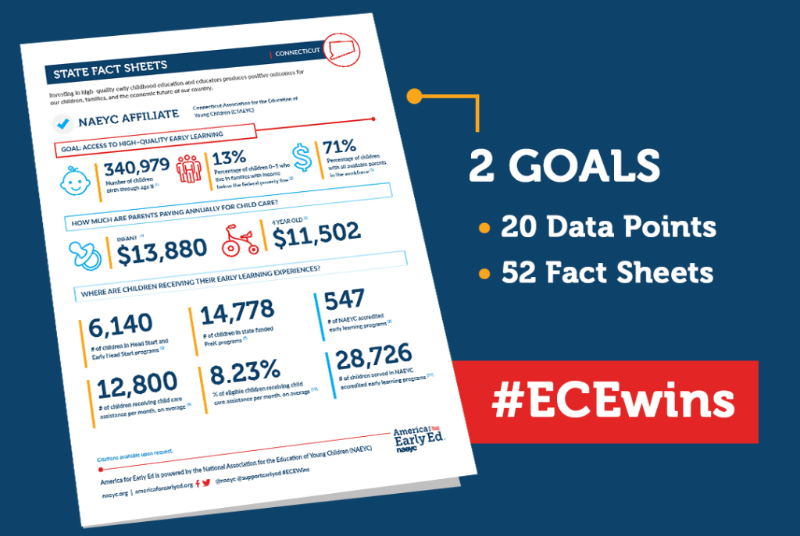They’re useful! They’re readable! They’re colorful! And starting today, they’re accessible to everyone! Introducing NAEYC’s America for Early Ed State Fact Sheets, highlighting 20 key data points and priorities to help you talk with policymakers about what’s happening in early childhood education and for early childhood educators.
Each State Fact Sheet contains data gathered from federal and national sources, as well as NAEYC’s Early Learning Program and Higher Education Quality Accreditation Systems. The data are organized to bring attention to two key goals: (1) increasing access to high-quality early learning and (2) advancing the early childhood education profession. We encourage you download your state’s fact sheet, share it with your networks and on social media (see sample posts below), and join us as we work together to deliver on the promise of high-quality early learning!
Sharing State Fact Sheets: Sample Social Media and Images
- Looking forward to using new state fact sheets from @naeyc @SupportEarlyEd to advocate for high-quality #earlyed and a stronger #ECE profession! Access your state’s fact sheet here: https://bit.ly/2QjzpOc #ECEWins
- DYK? Only a fraction of eligible children receive #childcare assistance each month. We can do better. Can’t wait to use fact sheets from @naeyc @supportearlyed to show policymakers what’s happening in #ECE, and why they need to #FundChildCare. https://bit.ly/2QjzpOc #ECEWins
- Great goals (increasing access to high-quality #earlyed and advancing the #ECE profession) + Great data (from @CSCCEUCB @CLASP @PreschoolToday and more) = Great fact sheets from @NAEYC @SupportEarlyEd! Check them out at https://bit.ly/2QjzpOc #ECEWins
Your Advocacy Matters!
We like developing advocacy tools and resources (see here and here) because you all do amazing things with them! (Did you see this list!?)
A Win in the House
Just recently, for example, with support and outreach from educators and advocates, the House Appropriations Committee approved the Labor, Health and Human Services, and Education appropriations bill for FY 2020, which included another $2.4 billion increase to CCDBG, as well as more funds for Head Start, Preschool Development Grants, CCAMPIS, and other important programs for children, families, and educators!
This is great news, but there is a still a long way to go, as over the next couple of months, Congress will continue to engage in critical discussions about overall funding levels for FY 2020. The outcome of these discussions will determine the actual funding levels for child care—and whether we can continue to increase funding for high-quality child care. Now is a great time to let your Senators and Representatives know what increased investments in child care mean to you, and the children, families, educators and businesses in your community! And if you have one to tell–or you know someone who does–you can always share your child care story right here.
An Opportunity Ahead
As we all know, there is no path to high-quality early childhood education without high-quality early childhood educators, and the reauthorization of the Higher Education Act (HEA) offers an opportunity to support current and future educators by investing in their professional preparation and development, as well as their access to affordable, quality higher education. While you’re checking out the data on your fact sheets to see how your state supports early childhood educators, take a look at the shared recommendations that 16 early childhood education organizations provided to Congress. Embedding these recommendations in a reauthorized Higher Education Act would help build a stronger early childhood education profession that will set our nation’s young children on a path to success. Our country thrives when they do–and that’s a fact.





